tl;dr
new TreeMap <>(
Map.of(
52.1d , 1 ,
53.4d , 2 ,
57.1d , 3 ,
59.4d , 7 ,
60.2d , 11 ,
71.6d , 16
)
)
.floorKey( 58.0d ) // Or call `.ceilingKey( 58.0d )`
See this code run live at IdeOne.com.
57.1
NavigableMap::lowerKey/higherKey
TreeMap is a NavigableMap.
The NavigableMap interface provides methods for retrieving adjacent keys (and entries).
Repeat the commands to fetch as many adjacent keys as you desire, until receiving a null.
Comparing keys
On second reading, it seems you do not have a key. You have a value you want to compare to keys in a map.
In this case, fetch a Set of all the keys in the map. NavigableMap extends SortedMap. So we can call SortedMap::keySet. The returned set iterates in sorted order.
Set< Double > set = map.keySet() ;
Make a List of that, to access individual elements by index.
List< Double > doublesListSorted = List.of( set.toArray() ) ; // Get un-modifiable list.
Now you can loop the sorted list to compare values.
NavigableMap::floorKey/ceilingKey
Or, as dnault commented, we can ask the NavigableMap to compare key values for a nearest-match.
floorKey
Returns the greatest key less than or equal to the given key, or null if there is no such key.ceilingKey
Returns the least key greater than or equal to the given key, or null if there is no such key.
Example code
Make an input map. We use Map.of initially for its convenient literal syntax. Then we feed that un-modifiable map to the constructor of TreeMap. Our literal input seen here happens to be sorted, but that is irrelevant, as the TreeMap constructor will sort the entries by key.
NavigableMap < Double, Integer > map =
new TreeMap <>(
Map.of(
52.1d , 1 ,
53.4d , 2 ,
57.1d , 3 ,
59.4d , 7 ,
60.2d , 11 ,
71.6d , 16
)
);
map.toString(): {52.1=1, 53.4=2, 57.1=3, 59.4=7, 60.2=11, 71.6=16}
Set our target to which we want the closest matches.
Double target = 58.0d;
Get the adjacent keys, next lower, and next higher.
Double nextLower = map.floorKey( target );
Double nextHigher = map.ceilingKey( target );
nextLower = 57.1
nextHigher = 59.4
See this code run live at IdeOne.com.
Notes:

